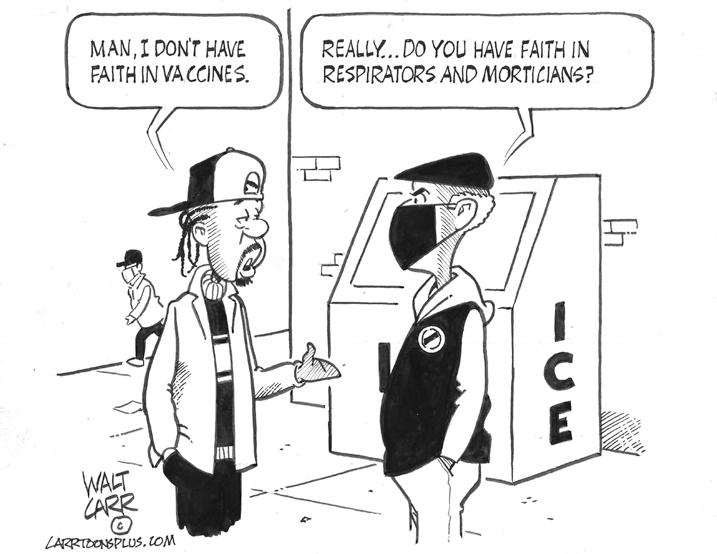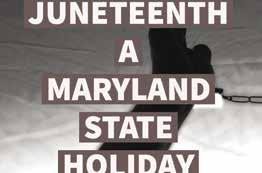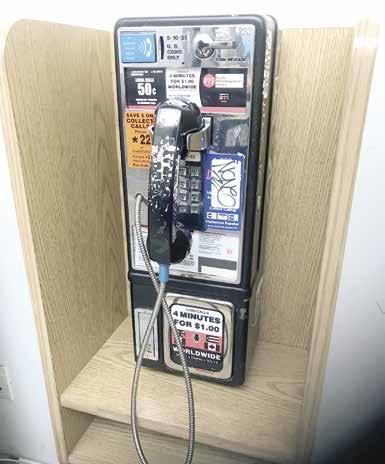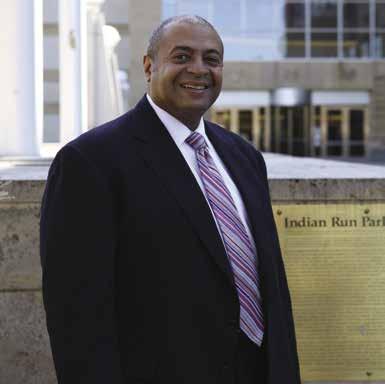
11 minute read
Education
Student Data Collection Mired in Controversy
Sam P.K. Collins WI Staff Writer
Over the last decade as a special education teacher, Dr. Dawn Welters has often had to collect data about her students and chart a path for their academic success using quantitative information passed on from previous instructors.
Even with pre-COVID data, Welters said continuing that tradition has proven difficult because of what she described as the perilous conditions of virtual learning and time constraints imposed upon her and her colleagues.
“We have to collect data and sometimes [administrators] give us a specific time window to do some of those things and it’s not enough for me and my students,” said Welters, who works with six deaf and hard-of-hearing elementary students.
“It’s been overwhelming collecting data this year,” she added. “From what I’m seeing, there’s been some improvement, but not what’s expected during the school year. We should be seeing more of an improvement with students by this time but they’re not [yet] up to their full potential.”
Welters’ concerns come amid the release of a report from the Office of the D.C. Auditor (ODCA) that details the lack of District-wide, longitudinal data about District students, what officials deemed more than necessary during a pandemic where students have experienced learning loss.
On March 10, ODCA officials contended that the District hasn’t created the means to determine
5 Dr. Dawn Welters (Courtesy photo)
what each student learns each year, nor do they have any idea about student-teacher linkages. Without such data, OSSE would be unable to predict which students are the most likely to repeat a grade in high school.
According to officials, the lack of data has also left them in the dark about the progress of each public and public charter school graduate in postsecondary studies and workforce development.
Last month, a survey conducted by the DC State Board of Education found that less than one-third of teachers have been able to cover the same amount of content in the virtual learning space as would have been the case under normal circumstances. Teachers also reported lower levels of student engagement in Wards 7 and 8.
D.C. Councilmembers Mary Cheh (D-Ward 3) and Robert White (D-At large), both of whom led efforts for the data collection revamp with the introduction of legislation nearly three years ago, said such an undertaking would help students falling further behind during the pandemic.
Erin Roth, ODCA’s director of education research, shared their sentiments.
“The District needs data to plan supports and interventions, and they need it going back as many grades as possible,” Roth said.
“Our current data collections have been significantly disrupted, but other states are relying on coursework, survey data, and other predictive tools to ensure students are staying on track. This needs to be used in D.C. We can invest in it right away to build it.” WI @SamPKCollins
For Most Teachers, an Extremely Tough Road Lies Ahead
State Board Survey Hints at Massive Teacher Exodus
Sam P.K. Collins WI Staff Writer
As various local institutions attempt to return to pre-COVID activity levels, teachers too are mulling when, and even whether, to reenter the classroom. Though many have embraced on-campus safety protocols and taken vaccinations, there remains the question of the pandemic’s impact on student learning. For Gina Abrams, the pandemic placed teachers in a tough position, as many were still expected to successfully provide grade-level instruction to students with significant pandemic-related learning gaps. She said administrators often placed the onus on her to not only articulate complicated concepts to students, but compete with forces at home that impeded their progress.
“It was hard for the students to access that material but they were still tested with the same type of benchmarks. Why would you expect them to be at a [certain] level if they didn’t finish kindergarten?” said Abrams, a first grade DCPS teacher.
“I don’t know how the kids will make up all that loss. Summer school won’t solve it. Maybe being in person might help, but [DCPS] dropped the ball when they made us start the [grade-level] curriculum, not what students missed.”
As shown in a survey conducted by the D.C. State Board of Education, several teachers share Abrams’ sentiments.
The survey, released in March, showed that nearly half of teachers in the District’s public and public charter sectors considered leaving the profession because of difficulties encountered during the pandemic.
Two out of three teachers said they couldn’t cover the same amount of content during virtual learning as had been the case during in-person instruction. More than three out of four teachers indicated that students had internet that was too slow for virtual learning, while three out of five recounted students experiencing computer issues.
The survey also highlighted inequities among students in Wards 7 and 8 and concerns among nearly seven out of 10 teachers about being unable to meet their students’ increasingly strong socio-emotional needs.
In response to the survey, D.C. Public Schools (DCPS) Chancellor Lewis Ferebee highlighted the launch of Rigorous Instruction Supports Equity, a federally funded program through which teachers at 43 schools receive equity-centered professional development and performance-based incentive awards.
As teachers increasingly make the return to campuses across the District, some like Andrew Green said they look forward to the opportunity to effectively instruct their students. Given the hurdles faced while conducting virtual learning, Green pondered why District officials couldn't make these arrangements earlier.
“Every part of the school day is affected by inequities,” he added.
WI @SamPKCollins
Maryland HBCU Presidents Celebrate Historic Lawsuit Settlement
Battle Waged over 15 Years about Higher Education Discrimination
Hamil R. Harris WI Contributing Writer
For 15 years administrators at four historically black colleges in the state of Maryland have fought over a system that made sure that that they didn’t get the money and resources that they needed.
But this week the presidents of Morgan State, Coppin State and the University of Maryland Eastern Shore joined their colleague at Bowie State to sign an historic agreement with the governor of Maryland to end decades of discrimination.
“We are here to enact an historic, bipartisan measure that will be an unprecedented step forward in addressing inequities in our higher education system by making additional substantial investments in Maryland’s historically Black colleges and universities,” said Hogan who was joined by Senate President Bill Ferguson, House Speaker Adrienne Jones and Lt. Gov. Boyd K. Rutherford.
Bowie State University President Aminta Breaux hosted the event that she called “a historic bill signing alongside our fellow Maryland HBCUs, concluding 15 years of advocacy to correct inequitable state funding.”
Coppin State President Anthony L. Jenkins tweeted, “With gratitude we thank @GovLarryHogan who signed SB1 HB1 (the HBCU Bill) into law, ensuring $577M over 10 years in state resources for Maryland's four HBCUs”.
Morgan State University President David Wilson also hailed March 24 as an “historic day.”
“After 15 years of litigation, settlement is finally reached,” he said. “With the $20 million or so coming to Morgan, we will mount a few degree programs to be in alignment with the human work of the future. I wanted to make sure the signature was in non-erasable ink!”
University of Maryland Eastern Shore President Heidi Anderson expressed her gratitude grateful to Hogan for signing the $577 million settlement bill. “It will provide #UMES $9.6 million annually in additional funding over the next 10 years!”
The legislation brings to an end a 15-year-long legal battle in the state between the HBCU’s and the predominantly white institutions over the most equitable way to allocate programs that were often duplicated in both type of schools.
“No governor in the history of the state has ever invested more in Maryland’s HBCUs,” Hogan said at the press conference. “Our administration has advanced more than a billion dollars in major projects at all
four HBCUs in Maryland, including for the new Communication, Arts, and Humanities building here at Bowie State.”
The lawsuit alleged that, by duplicating programs, the state of Maryland was undermining its own HBCU programs, and in the last two years, Hogan argued that the black colleges were getting too much money.
But according to the bill in the fiscal year 2023 fiscal year, the state will provide $57.7 million between the four universities based on student enrollment. Morgan State will receive $24 million in the first year, Bowie State $16.8 million, Eastern Shore $9.7 million, and Coppin State $9 million.
The bulk of this money will go to the institutions permanent source of revenue which is called the endowment. But even with this new money the HBCU’s still trail the state’s majority white institutions in terms of their endowment. WI
Why You Should Get Tested For COVID-19 Today
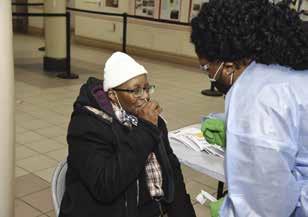
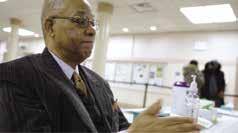
The past year has been incredibly difficult for our community. COVID-19 has taken a tremendous toll on each of us, with many losing jobs, losing time with our families, and worst of all, losing loved ones. Even as we see hopeful signs as the vaccine rolls out, ongoing COVID-19 testing remains critical to keep our community safe. Black Americans comprise 13% of the US population. Yet, more than half of all COVID-19 cases—and almost 60% of related deaths— occurred in US cities with large Black populations. All too often, Black people are tested for COVID-19 only after they catch it and go to a hospital with symptoms that have become difficult or impossible to treat. A Quest Diagnostics survey showed 72% of Black Americans have either delayed or avoided getting a diagnostic COVID-19 test even when they believed they needed one. Such reluctance carries a high price. By the time a Black American is hospitalized, the disease has often progressed to where no therapy can stop it. People in crisis often lack the information and resources to find a way out. To change this, Choose Healthy Life, United Way of New York City, and Quest Diagnostics are hosting COVID-19 testing and educational events in our local communities and in partnership with our churches. When trusted community leaders, including Black clergy, work with health experts to provide testing resources and much-needed support for those who test positive, it can have long-lasting, positive impacts on our community. “We’re bringing people together to teach about this pandemic,” said Rev. Calvin O. Butts III, Senior Pastor of The Abyssinian Baptist Church in Harlem, and co-chair of Choose Healthy Life. “The African-American church was the first place where we could get together and talk and learn. People come here because this is the most trusted institution in our community. The clergy have to be examples, and so, we got tested, and we encourage the community to get tested.” Events at local churches will enable people in our community to get their questions answered, while providing opportunities to get tested. This will help prevent the spread of COVID-19, provide guidance about quarantine, and help those who do test positive get access to care.
Testing Matters: It Can Save Lives
“It’s critical that we remain vigilant in 2021,” said Rev. Al Sharpton, President and CEO of the National Action Network, and co-chair of Choose Healthy Life. “As faith leaders, we are stepping up to provide critical testing and resources to help our communities fight back against the virus.” Once you’ve been tested, even if you show no symptoms, you can be properly diagnosed. If you test negative, that’s great! If you test positive, you can get treated sooner and more effectively. Your friends, families and coworkers can be notified and can quarantine if necessary. This helps stop COVID-19’s spread. It’s simple, easy and free—and it could save your life. Testing will occur in the coming months at Choose Healthy Life churches and local health centers in Atlanta, Detroit, Newark, New York, Washington, DC, and other US cities. At each event, local health navigators will share important testing and vaccine information with community members. Learn more at ChooseHealthyLife.org. “This virus is actually making people afraid to get tested. They don’t want to know. They think, ‘What am I going to do? Am I going to have to quarantine? If I get sick, it’s out of my control.’ It’s really a scary proposition. That’s why we’re seeing so many Black people who are not getting tested until they’re at the hospital,” said Sheena Wright, President & CEO of United Way of New York City, and the implementation partner for Choose Healthy Life. “We’ve been besieged with death, fear, concern, and sickness, and this is a beacon of light in the dark, where people can come and be treated. There is hope at the end of this very long tunnel,” added Wright. So please take action. Get tested. Your participation can help save the lives of thousands of Black Americans.
Reverend Dr. Calvin O. Butts, III preparing to receive his COVID-19 test. Dr. Butts has served as pastor at the Abyssinian Baptist Church for over 30 years, and is co-chair of the National Black Clergy Leadership Health Council.
Rev. Al Sharpton, co-chair of the Choose Healthy Life National Black Clergy Health Leadership Council, demonstrates the ease and necessity of COVID-19 testing to help address the disproportionate impacts of COVID-19 in Black communities. This event, held at the Abyssinian Baptist Church in Harlem on Jan. 25, is the first of hundreds of planned COVID-19 testing events at Black churches across the US, a partnership of Choose Healthy Life, Quest Diagnostics, and the United Way.
A community member is tested for COVID-19 at the Abyssinian Baptist Church in Harlem on Jan. 25. Hundreds of events like this one will take place in Black communities across the US, a partnership of Choose Healthy Life, Quest Diagnostics, and the United Way.

